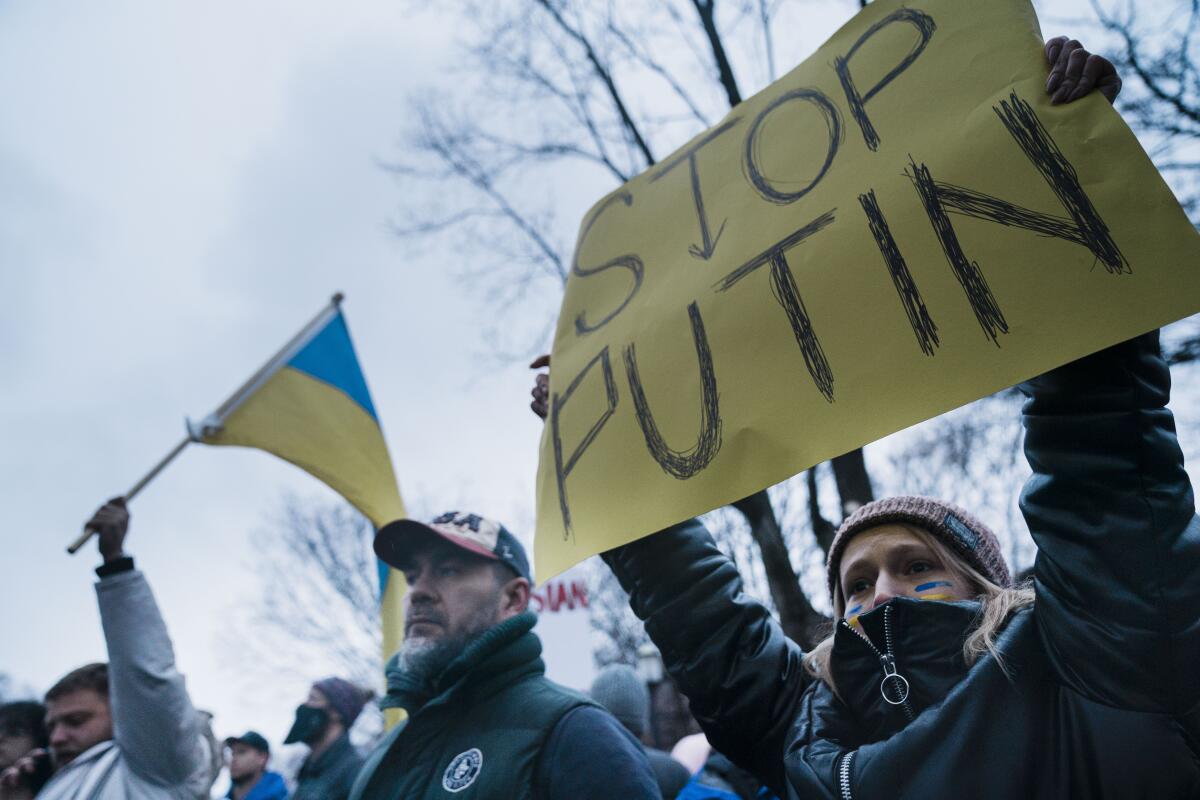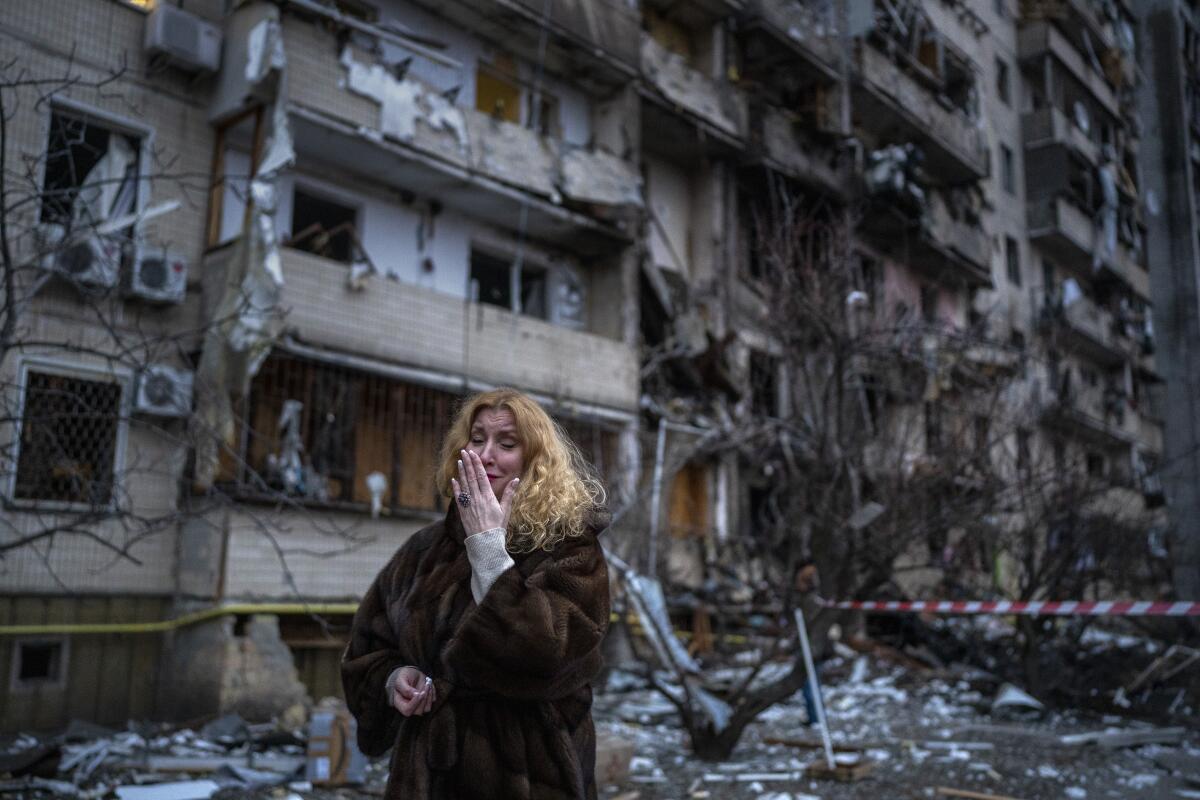We can’t accept that Putin will stop with Ukraine

- Share via
Good morning. I’m Paul Thornton, and it is Saturday, Feb. 26, 2022. Let’s look back at the week in Opinion.
There is an outright war of aggression in Europe, an extraordinary thing to write given the streak of relative peace among indisputably sovereign states on that continent since 1945. Though there are complicating factors involved that seasoned analysts and diplomats can dissect — whether, for example, NATO expansion after 1991 unnecessarily provoked Moscow — what Russia’s all-out invasion of Ukraine distills down to in its purest sense is an unprovoked attack by a nuclear-armed military superpower, controlled by an aggrieved, paranoid autocrat, against a budding democracy stubbornly trying to set its own course. In other words, this is a profound act of bullying by Vladimir Putin toward a weaker neighbor.
I am not an expert on Russian or European affairs, so I’ll get straight to the analyses by much smarter people on this topic. The Times Editorial Board laments that so far, blocking Russia from using the international banking transaction system known as SWIFT, a devastating economic response often referred to as a financial “nuclear option,” isn’t on the sanctions table. On The Times’ op-ed page, Russia expert Anna Ohanyan calls for NATO to adopt a new, more cooperative stance with Moscow that deters aggression. Also on the op-ed page, Stanford political scientist Kathryn Stoner takes an arguably bullish view on the ability of sanctions to influence Russia. Columnist Jonah Goldberg wonders if Putin has considered the foreign-policy mantra “be careful what you wish for.”
These are the opinions of experts, which I am not. What I am is part of a family that witnessed the last time a European power subjugated its neighbors with military force. The experiences my Norwegian grandparents and their brothers and sisters shared growing up during “de voor,” when Nazi Germany occupied their country from 1940-45, left an indelible mark on my understanding of history, one that became sadly relevant this week. What struck me listening to reports and hearing from readers that Ukrainians were stunned by the invasion — that Putin actually did it this time, after years of mere bellicosity — was how similar it was to what my grandparents described as their disbelief after the German invasion of Norway in April 1940.
They didn’t think that Hitler would actually do it, or that the British wouldn’t come to their rescue — until it actually happened. The warning signs were there, including a marginalized fascist movement within Norway that invited German occupation — but the British had their backs, they thought. And besides, why would Germany devote so many resources to subduing a country of fewer than 4 million people?
As my late grandmother told it, she and her family didn’t truly believe the radio broadcasts warning of an invasion until they hiked to the top of a large hill overlooking their fjord and saw for themselves German planes in the distance. None of it made much sense then — and we know now it was only a harbinger of much worse atrocities to come.
That’s what should also unsettle us — what’s next?

Omicron won’t be the last coronavirus variant to haunt us. Think back to last summer, when fewer than 20,000 daily new COVID-19 cases were being reported nationally, and we used July 4 to declare our independence from the pandemic. Then came the Delta surge, despite the availability of vaccines. After that was Omicron, despite the availability of boosters. Dr. Eric J. Topol warns us what may be ahead: “There is a misconception that the virus is destined to evolve to a more benign form. If we’ve learned anything from the pandemic, it’s that the virus has an extraordinary ability to adapt — and it is unpredictable.” L.A. Times
What’s less fair than the SAT? You might be surprised. “The University of California is rightly concerned about making its student application process as equitable as possible, yet it’s clinging to part of the application that clearly benefits wealthy students,” writes Karin Klein. “Not the SAT.... What UC inexplicably is holding on to, though, is the essay portion of its application.” L.A. Times
Trump isn’t the only ex-president to wring wealth out of the office. Take his predecessor, who followed in the tradition of every former commander in chief since Bill Clinton to rake in obscene wealth after a career in public service. Columnist Nicholas Goldberg writes: “Obama talks about trying to keep it real. ‘There’s only so much you can eat. There’s only so big a house you can have. There’s only so many nice trips you can take. I mean, it’s enough,’ he said in 2018. A year later he bought his 6,892-square-foot Martha’s Vineyard house on a 29-acre estate for $12 million. It’s a getaway from his $8-million, nine-bedroom house in Washington.” L.A. Times
Enjoying this newsletter? Consider subscribing to the Los Angeles Times
Your support helps us deliver the news that matters most. Become a subscriber.
These are the six things the next mayor of L.A. needs to do about homelessness, according to the editorial board: Don’t blame the root cause on mental illness and addiction; talk about increasing the city’s housing supply; talk about protecting vulnerable renters and others who may lose their homes; acknowledge that L.A. needs more permanent housing than shelter beds; don’t pander to voters by talking only about enforcement efforts; and come up with a citywide approach to replace the district-by-district disorganization we have now. L.A. Times
Nixon’s fabled trip to China led to today’s Taiwan crisis. The trip, 50 years ago this week, is seen as a heroic effort by a stolid anti-communist to catch this country up to the reality that mainland China was in fact ruled by the communists and not the republican forces exiled on Taiwan. But notes and contemporary accounts from that visit reveal that Richard Nixon was prepared to effectively give away Taiwan, writes Richard Mann: “Defenders of the 1972 negotiations have argued that they allowed the island to develop and prosper on its own for half a century. But Nixon and Kissinger would have been amazed to know Taiwan would survive separately from China for as long as it has.” L.A. Times
Stay in touch.
If you’ve made it this far, you’re the kind of reader who’d benefit from subscribing to our other newsletters and to the Times.
As always, you can share your feedback by emailing me at paul.thornton@latimes.com.
A cure for the common opinion
Get thought-provoking perspectives with our weekly newsletter.
You may occasionally receive promotional content from the Los Angeles Times.







